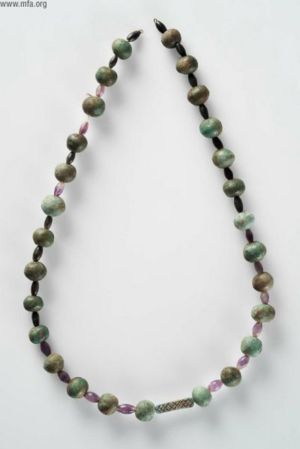Difference between revisions of "Hyksos"
DavidB4-bot (Talk | contribs) (→top: clean up & uniformity) |
|||
| (11 intermediate revisions by 8 users not shown) | |||
| Line 1: | Line 1: | ||
| − | HYKSOS, the Greek form of an | + | [[Image:Beads MFA Boston.jpg|thumb|Beads at MFA Boston]] |
| + | '''HYKSOS''', the [[Greek language|Greek]] form of an [[Egypt]]ian phrase: “rulers of foreign lands”, refers to a people who entered - possibly forcibly - into Egypt, and built their capital at Avaris in the [[Nile River|Nile]] Delta area in about 1648 B.C. during the Thirteenth Dynasty. There is uncertainty about the method of their takeover. They ruled – as the Fifteenth Dynasty - the northern third or so of Egypt until driven out by [[Ahmose]], first pharaoh of the Eighteenth Dynasty, around 1532. The rest of the country was ruled from [[Thebes]] as the Thirteenth and Fourteenth Dynasties, however [[Nubian]]s pushed up from the south and took over part of Egypt towards the end of this period and their rulers are known as the Seventeenth Dynasty. Because of the general disruption to the land of Egypt at this time, it is thought a minor branch of the Hyksos set themselves up as minor rulers, and they have been acknowledged as the Sixteenth Dynasty. | ||
| − | The Hyksos | + | The Hyksos used the [[Hittite]] Chariot which gives them a possible [[Hittite]] origin. However, they spoke a West Arabian dialect similar to the East Canaanite Amorite of the Old Babylonian kingdom ([[Amorites]]) that was conquered by the Hitties just 11 years earlier, which can explain the appearance of the Hittite chariots in Egypt and the absence of the IndoEuropean language. |
| − | Their historically brief domination had long lasting | + | Their historically brief domination had long lasting effects. They introduced the [[horse]] and the chariot to Egypt; and, perhaps, the upright [[loom]], and [[olive]]. They forced the end of Egypt’s long held isolation, as the early rulers of the Eighteenth Dynasty set about creating buffer states in [[Palestine]]; and this contact with the outside world led to the flowering of culture that this Dynasty is known for. |
| − | The period of their control in Egypt ( | + | The period of their control in Egypt (1648-1532 BC) is known as the Second Intermediate Period. |
| + | |||
| + | ==Hyksos in Literature== | ||
| + | The [[Wilbur Smith]] novel, ''River God'', is set in ancient Egypt just before and during the Hyksos invasion. It depicts the Hyksos as ruthless barbarians. | ||
| + | |||
| + | == See also == | ||
| + | *[[Middle Kingdom]] | ||
| + | *[[Cleopatra]] | ||
| + | |||
| + | |||
| + | [[Category:Egypt]] | ||
| + | [[Category:Ancient History]] | ||
Revision as of 20:53, July 12, 2016
HYKSOS, the Greek form of an Egyptian phrase: “rulers of foreign lands”, refers to a people who entered - possibly forcibly - into Egypt, and built their capital at Avaris in the Nile Delta area in about 1648 B.C. during the Thirteenth Dynasty. There is uncertainty about the method of their takeover. They ruled – as the Fifteenth Dynasty - the northern third or so of Egypt until driven out by Ahmose, first pharaoh of the Eighteenth Dynasty, around 1532. The rest of the country was ruled from Thebes as the Thirteenth and Fourteenth Dynasties, however Nubians pushed up from the south and took over part of Egypt towards the end of this period and their rulers are known as the Seventeenth Dynasty. Because of the general disruption to the land of Egypt at this time, it is thought a minor branch of the Hyksos set themselves up as minor rulers, and they have been acknowledged as the Sixteenth Dynasty.
The Hyksos used the Hittite Chariot which gives them a possible Hittite origin. However, they spoke a West Arabian dialect similar to the East Canaanite Amorite of the Old Babylonian kingdom (Amorites) that was conquered by the Hitties just 11 years earlier, which can explain the appearance of the Hittite chariots in Egypt and the absence of the IndoEuropean language.
Their historically brief domination had long lasting effects. They introduced the horse and the chariot to Egypt; and, perhaps, the upright loom, and olive. They forced the end of Egypt’s long held isolation, as the early rulers of the Eighteenth Dynasty set about creating buffer states in Palestine; and this contact with the outside world led to the flowering of culture that this Dynasty is known for.
The period of their control in Egypt (1648-1532 BC) is known as the Second Intermediate Period.
Hyksos in Literature
The Wilbur Smith novel, River God, is set in ancient Egypt just before and during the Hyksos invasion. It depicts the Hyksos as ruthless barbarians.
